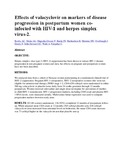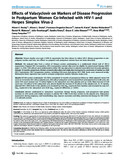| dc.description.abstract | Objective:
Herpes simplex virus type 2 (HSV-2) suppression has been shown to reduce HIV-1 disease progression in nonpregnant
women and men, but effects on pregnant and postpartum women have not been described.
Methods:
We analyzed data from a cohort of Kenyan women participating in a randomized clinical trial of HSV-2
suppression. Pregnant HIV-1-seropositive, HSV-2-seropositive women who were not eligible for antiretroviral therapy (WHO
stage 1–2, CD4.250 cells/ml) were randomized to either 500 mg valacyclovir or placebo twice daily from 34 weeks gestation
through 12 months postpartum. Women received zidovudine and single-dose nevirapine for prevention of mother-to-child
HIV-1 transmission. HIV-1 progression markers, including CD4 count and plasma HIV-1 RNA levels, were measured serially.
Multivariate linear regression was used to compare progression markers between study arms.
Results:
Of 148 women randomized, 136 (92%) completed 12 months of postpartum follow-up. While adjusted mean CD4
count at 12 months (565 cells/ml placebo arm, 638 cells/ml valacyclovir arm) increased from antenatal levels in both arms, the
mean CD4 count increase was 73 cells/ml higher in the valacyclovir arm than placebo arm (p=0.03). Mean increase in CD4
count was 154 cells/ml in the valacyclovir arm, almost double the increase of 78 cells/ml in the placebo arm. At 12 months,
adjusted HIV-1 RNA levels in the placebo arm increased by 0.66 log 1 0 copies/ml from baseline, and increased by only 0.21
log1 0 copies/ml in the valacyclovir arm (0.40 log 1 0 copies/ml difference, p=0.001).
Conclusion:
Women randomized to valacyclovir suppressive therapy during pregnancy and postpartum had greater
increases in CD4 counts and smaller increases in plasma HIV-1 RNA levels than women in the placebo arm. Valacyclovir
suppression during pregnancy and breastfeeding may improve outcomes and delay antiretroviral therapy for HIV-1/HSV2
co-infected women | en |


